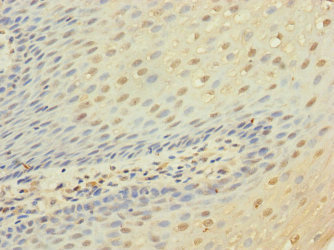![FACS analysis of human peripheral blood using GTX79940 CD53 antibody [MEM-53] (FITC). FACS analysis of human peripheral blood using GTX79940 CD53 antibody [MEM-53] (FITC).](https://www.genetex.com/upload/website/prouct_img/normal/GTX79940/GTX79940_20191025_AP_006_338_w_23061322_781.webp)
FACS analysis of human peripheral blood using GTX79940 CD53 antibody [MEM-53] (FITC).
CD53 antibody [MEM-53] (FITC)
GTX79940
ApplicationsFlow Cytometry
Product group Antibodies
ReactivityHuman
TargetCD53
Overview
- SupplierGeneTex
- Product NameCD53 antibody [MEM-53] (FITC)
- Delivery Days Customer9
- Application Supplier NoteFCM: 20 microl reagent / 100 microl of whole blood or 106 cells in a suspension. *Optimal dilutions/concentrations should be determined by the researcher.Not tested in other applications.
- ApplicationsFlow Cytometry
- CertificationResearch Use Only
- ClonalityMonoclonal
- Clone IDMEM-53
- ConjugateFITC
- Gene ID963
- Target nameCD53
- Target descriptionCD53 molecule
- Target synonymsMOX44, TSPAN25, leukocyte surface antigen CD53, CD53 antigen, CD53 glycoprotein, CD53 tetraspan antigen, antigen MOX44 identified by monoclonal antibody MRC-OX44, cell surface antigen, cell surface glycoprotein CD53, tetraspanin-25, transmembrane glycoprotein, tspan-25
- HostMouse
- IsotypeIgG1
- Protein IDP19397
- Protein NameLeukocyte surface antigen CD53
- Scientific DescriptionThe protein encoded by this gene is a member of the transmembrane 4 superfamily, also known as the tetraspanin family. Most of these members are cell-surface proteins that are characterized by the presence of four hydrophobic domains. The proteins mediate signal transduction events that play a role in the regulation of cell development, activation, growth and motility. This encoded protein is a cell surface glycoprotein that is known to complex with integrins. It contributes to the transduction of CD2-generated signals in T cells and natural killer cells and has been suggested to play a role in growth regulation. Familial deficiency of this gene has been linked to an immunodeficiency associated with recurrent infectious diseases caused by bacteria, fungi and viruses. Alternative splicing results in multiple transcript variants. [provided by RefSeq, Mar 2016]
- ReactivityHuman
- Storage Instruction2°C to 8°C
- UNSPSC41116161







